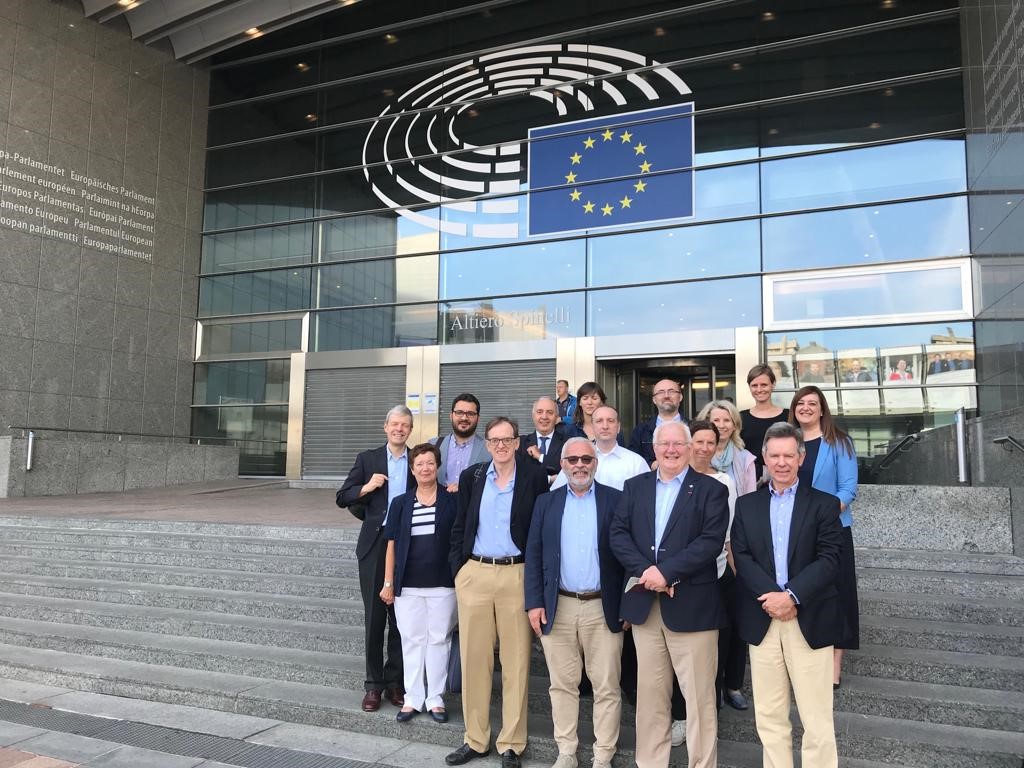On July 18th and 19th, FEBA organized the second meeting of our EU Working Group in Brussels. Following the Working Table on Advocacy with European institutions at the FEBA Annual Convention in Rome and European elections that took place last May, FEBA convened a meeting of FEBA EU Working Group in order to continue the work with our members and define the next steps of our action at European level, in particular as regards the next Multi-Annual Financial Framework (MFF), including the European Social Fund Plus (ESF+), and the new delegated act on food waste measurement.
The two-day meeting held at the FEBA office and the European Parliament was attended by 15 Food Bank representatives from a total of 14 countries (Austria, Belgium, Denmark, France, Germany, Greece, Ireland, Italy, Lithuania, Malta, Netherlands, Romania, Slovenia, Spain), some representatives of European institutions, and the FEBA team.
The workshop, which was funded thanks to the Employment and Social Innovation (EaSi) programme of the European Commission, had the following objectives:
- To update participants about the new European leadership;
- To train participants about the current state of negotiations for the new ESF+, as well as the different position of the three core institutions the European Parliament, the Council of the EU and the European Commission;
- To strengthen the knowledge of participants on the current state of EU food waste measurement legislation;
- To draft a roadmap for more direct and cohesive advocacy with European institutions.
The workshop started out with a presentation from Jan Behrens (DG Employment, Social Affairs and Inclusion, European Commission) who presented the European Commission’s proposal for the new ESF+ under the MFF 2021-2027. He also went into detail on what amendments and changes to the proposed plan, the Coreper and the European Parliament had agreed upon to date. His overview was completed the next day by presentations from Rossella Rusca (Italy’s Permanent Representation to the EU) who outlined the Coreper’s current position on the new ESF+, and Inmaculada Mateos Buendia and Marco Leonardi, two Policy Advisors at the European Parliament who described the European Parliament’s resolution and the current situation in the newly elected chamber.
Regarding the topic of EU food waste measurement legislation, participants listened to a presentation by Bartosz Zambrzycki (DG Health and Food Safety, European Commission) who gave an introduction into the European Commission’s approach to monitoring food waste at European and national level. The content-related portion of the first day of the Meeting ended with two Working Tables who discussed and later presented possible ways and ideas for a more direct approach for FEBA to contribute to the on-going decision-making process.
All of these highly technical discussions and presentations were framed by two successful working lunches and a delicious group dinner on Thursday. Holding the second day of the meeting at the European Parliament also presented a highlight, even though no MEPs were there, as it was a Strasbourg week. The atmosphere among the participants was enthusiastic and everyone agreed that the meeting was an important next step for FEBA and the national Food Banks towards reaching a broader understanding of and establishing better advocacy and cooperation with EU institutions.




